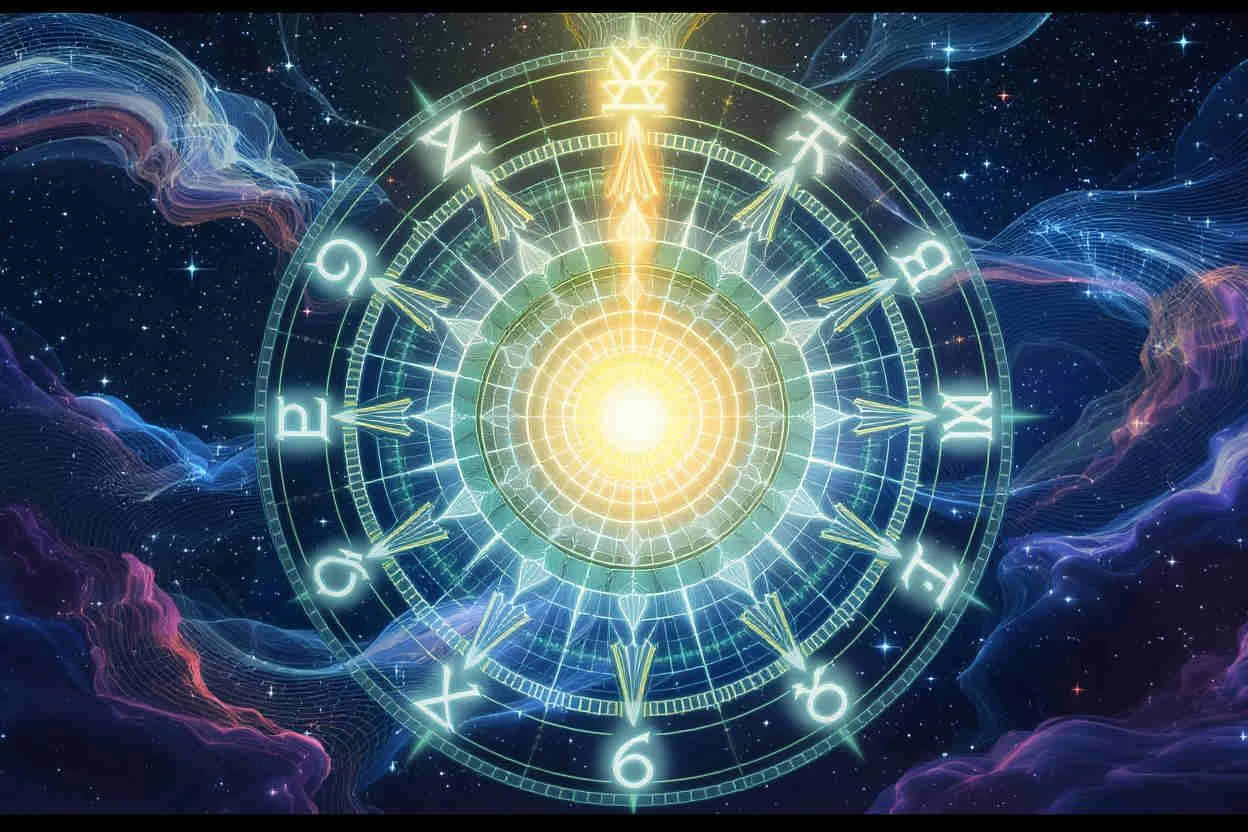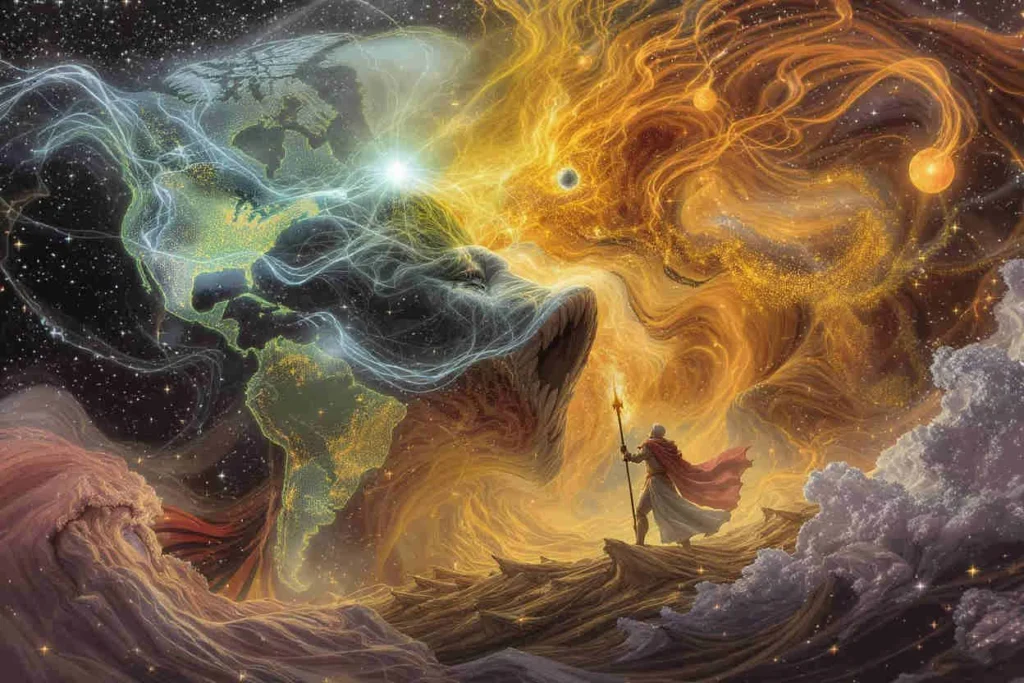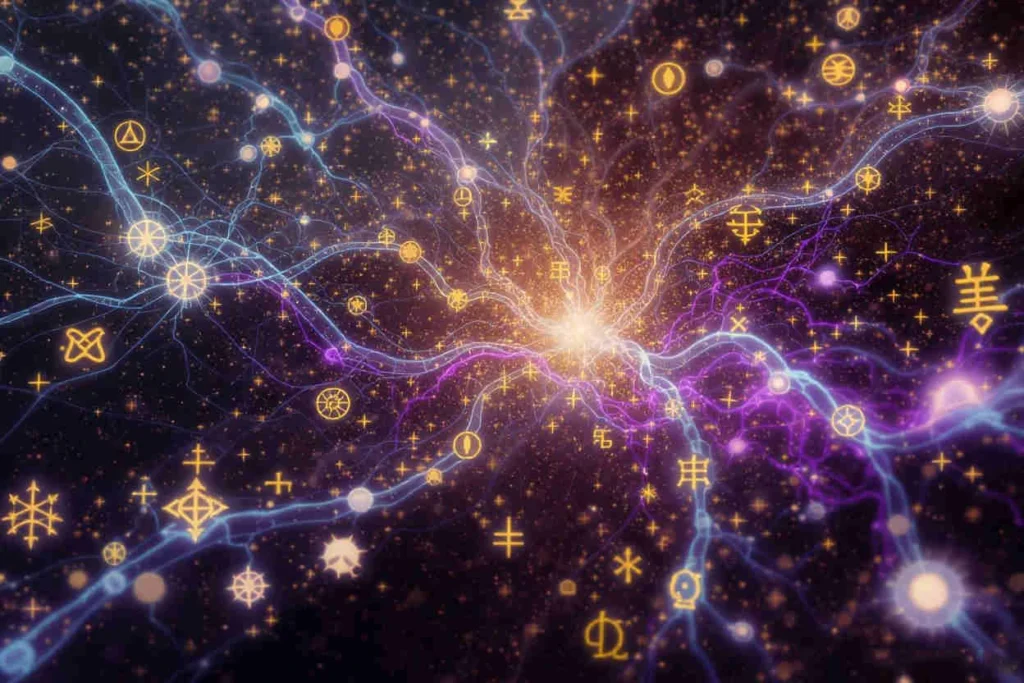Archetypal Symbols: The Blueprint Patterns Shaping Your Path

You’ve felt it before—that moment when a character in a movie speaks directly to your soul, or when a stranger’s story mirrors your own journey so perfectly it gives you chills. You’re witnessing the power of archetypal symbols, the universal patterns that Jung called “the blueprint of the human psyche.”
These aren’t just abstract concepts from psychology textbooks. Archetypal symbols are the invisible forces shaping your relationships, career choices, spiritual awakening, and deepest desires. They’re the reason certain symbols feel like coming home while others leave you cold.
Today, you’ll discover the 12 powerful archetypes living within you and learn how recognizing their symbolic language can transform your understanding of yourself and your path forward.
Begin Your Symbol Journey
Start decoding the messages that have been waiting for you. Your free guide is just one click away.
Get instant access to our essential guide:
“SYMBOL WISDOM STARTER KIT – Your Complete Guide to Personal Symbol Interpretation.“
🔍 What Are Archetypal Symbols?
Archetypal symbols are universal patterns of human experience that appear across all cultures and throughout history. Think of them as the original programming language of consciousness—patterns so fundamental they’re hardwired into human psychology.
Carl Jung discovered that certain symbols, characters, and themes appear in myths, dreams, and stories worldwide, regardless of cultural contact. A mother figure protecting her children. A wise old man offering guidance. A hero facing impossible odds. These patterns repeat because they represent core aspects of human experience.
But here’s what makes archetypal symbols different from regular symbols: they carry emotional and psychological weight that transcends personal experience. When you encounter your dominant archetype in symbolic form, something deep within you recognizes itself.
The Three Levels of Archetypal Influence
- Personal Level: How archetypes shape your individual personality and choices
- Collective Level: How they influence cultural movements and shared human experiences
- Symbolic Level: How they appear in dreams, synchronicities, and spiritual encounters

🌟 The 12 Universal Archetypes: Your Inner Council
While Jung identified many archetypes, twelve core patterns form the foundation of human experience. Each carries specific symbols, motivations, and gifts. Most people have 2-3 dominant archetypes that guide their major life decisions.
The Ego Archetypes: Seeking Paradise
1. The Innocent
- Core Symbol: Child, Garden, White Light
- Motivation: To be happy and live in harmony
- Gift: Faith, optimism, and trust
- Shadow: Naivety and denial of harsh realities
You know you’re channeling the Innocent when you see the best in people, believe in happy endings, and feel called to preserve what’s pure and good in the world.
2. The Explorer
- Core Symbol: Road, Mountain, Horizon
- Motivation: To find yourself through exploration
- Gift: Courage, authenticity, and pioneering spirit
- Shadow: Aimless wandering and fear of commitment
The Explorer in you craves freedom, abhors conformity, and believes that life’s meaning comes through experience and adventure.
3. The Sage
- Core Symbol: Owl, Books, Light/Illumination
- Motivation: To understand the world and share wisdom
- Gift: Wisdom, intelligence, and teaching ability
- Shadow: Overthinking and disconnection from emotion
When you’re driven to seek truth, share knowledge, and help others understand complex concepts, you’re expressing your inner Sage.
The Soul Archetypes: Leaving a Mark
4. The Hero
- Core Symbol: Sword, Shield, Mountain Peak
- Motivation: To prove worth through courageous action
- Gift: Courage, determination, and honor
- Shadow: Arrogance and need for enemies to fight
Your Hero archetype emerges when you feel called to overcome challenges, protect others, and prove that anything is possible with enough determination.
5. The Outlaw
- Core Symbol: Mask, Breaking Chains, Storm
- Motivation: To overturn what isn’t working
- Gift: Revolution, freedom, and authentic power
- Shadow: Destructiveness and criminal behavior
The Outlaw in you rebels against injustice, questions authority, and isn’t afraid to break rules that serve no one.
6. The Magician
- Core Symbol: Wand, Spiral, Transformation
- Motivation: To understand the laws of the universe
- Gift: Vision, inventiveness, and a catalyst for change
- Shadow: Manipulation and becoming a con artist
When you’re drawn to transformation, see connections others miss, and feel capable of manifesting your vision into reality, you’re channeling the Magician.
The Social Archetypes: Connecting with Others
7. The Everyman
- Core Symbol: Circle, Home, Common Tools
- Motivation: To belong and connect with others
- Gift: Empathy, realism, and lack of pretense
- Shadow: Losing self in the group
Your Everyman archetype values community, seeks common ground, and believes that everyone deserves respect and dignity.
8. The Lover
- Core Symbol: Heart, Rose, Embrace
- Motivation: To find and give love
- Gift: Passion, commitment, and devotion
- Shadow: Jealousy and losing identity in relationships
The Lover in you seeks deep connection, values beauty and harmony, and believes that love is the most powerful force in existence.
9. The Jester
- Core Symbol: Mask (Comedy), Bells, Light/Laughter
- Motivation: To enjoy life and help others do the same
- Gift: Joy, humor, and living in the present
- Shadow: Frivolity and wasting time
When you use humor to heal, refuse to take life too seriously, and believe that joy is a form of wisdom, you’re expressing your inner Jester.
The Self Archetypes: Providing Structure
10. The Caregiver
- Core Symbol: Mother, Shield, Healing Hands
- Motivation: To help others
- Gift: Compassion, generosity, and nurturing
- Shadow: Martyrdom and enabling others
Your Caregiver archetype emerges when you feel called to protect, nurture, and serve others, often putting their needs before your own.
11. The Ruler
- Core Symbol: Crown, Throne, Scales of Justice
- Motivation: To create prosperity and success
- Gift: Leadership, responsibility, and vision
- Shadow: Tyranny and power for its own sake
The Ruler in you takes charge naturally, accepts responsibility for outcomes, and believes in creating order from chaos.
12. The Creator
- Core Symbol: Artist’s Tools, Light, Building Blocks
- Motivation: To create something of enduring value
- Gift: Creativity, imagination, and artistic ability
- Shadow: Perfectionism and creative blocks
When you’re driven to express your unique vision, turn ideas into reality, and leave something beautiful behind, you’re channeling the Creator.
🧠 How Archetypal Symbols Impact Your Subconscious Mind
Archetypal symbols don’t just influence your conscious thoughts—they operate at a much deeper level, shaping your decisions, attractions, and life path through your subconscious mind.
The Subconscious Recognition System
Your subconscious mind constantly scans your environment for archetypal patterns. When it recognizes symbols connected to your dominant archetypes, it triggers emotional responses that influence your behavior:
- Attraction responses: You’re drawn to people, places, and opportunities that resonate with your archetypal patterns
- Avoidance responses: You instinctively move away from symbols that trigger your archetypal shadows
- Decision-making influence: Archetypal symbols bias your choices toward patterns that feel “right” for your psyche
- Emotional resonance: Certain symbols create immediate emotional responses based on archetypal activation
This is why you might feel instantly connected to someone wearing a piece of jewelry that matches your archetypal symbols, or why certain career paths feel “meant to be” while others feel completely wrong.
The Neurological Basis of Archetypal Recognition
Recent neuroscience research reveals that archetypal symbols activate specific neural networks associated with emotion, memory, and pattern recognition. When you encounter symbols linked to your dominant archetypes:
- Your amygdala (emotional center) responds before conscious analysis
- Mirror neurons fire, creating empathetic connections
- Memory networks activate, connecting present experiences to past patterns
- Reward pathways release feel-good chemicals when you encounter “your” symbols

🔄 When You Keep Seeing Repeated Archetypal Symbols
If you’ve been noticing the same archetypal symbols repeatedly—in dreams, random encounters, or media—your psyche is trying to communicate something important about your current life phase.
What Repeated Symbols Mean
Activation Phase: When you see symbols of an archetype you haven’t been expressing, it often means that archetype is trying to emerge in your life. A shy person seeing repeated Hero symbols might be called to step into leadership.
Integration Phase: Seeing mixed archetypal symbols suggests you’re learning to balance different aspects of your personality. Creator symbols alongside Ruler symbols might indicate you’re learning to structure your creative process.
Shadow Phase: Sometimes repeated symbols represent your archetypal shadow—the aspects you’ve been avoiding or suppressing. Outlaw symbols appearing to a people pleaser might indicate suppressed anger or a need for authentic expression.
Reflection Prompt: “The archetypal symbol I keep seeing is… and it makes me feel… I wonder if my soul is trying to tell me…”
📚 The Historical Evolution of Archetypal Symbols
Archetypal symbols haven’t remained static throughout history. While their core essence stays constant, their manifestations evolve with human consciousness and cultural development.
Ancient Origins
The earliest human cave paintings show archetypal symbols: the hunt (Hero), the mother figure (Caregiver), the shaman (Magician). These weren’t just decorative—they were humanity’s first attempts to understand and work with universal patterns of experience.
Ancient civilizations developed sophisticated symbolic systems around archetypes:
- Egyptian mythology: Gods and goddesses embodying specific archetypal patterns
- Greek theater: Dramatic archetypes that still influence storytelling today
- Hindu tradition: Chakra systems mapping archetypal energies in the human body
- Norse mythology: Archetypal figures representing cosmic forces and human nature
Modern Transformations
Today’s archetypal symbols blend ancient wisdom with contemporary understanding:
- Technology integration: Digital symbols carrying archetypal meaning (app icons, emojis, virtual avatars)
- Pop culture evolution: Superhero movies, fantasy literature, and video games as modern mythology
- Global synthesis: Eastern and Western archetypal systems merging in new therapeutic and spiritual practices
- Scientific validation: Neuroscience and psychology confirming what ancient traditions always knew
🌙 Dream Symbols vs. Waking Symbols: Different Languages
Archetypal symbols appear differently in dreams versus waking life, each carrying distinct messages and requiring different interpretation approaches.
Dream Archetypal Symbols
In dreams, archetypal symbols often appear:
- Exaggerated: More intense and dramatic than waking experiences
- Fluid: Shapeshifting and combining in ways that defy logic
- Personal: Blended with your individual memories and experiences
- Emotional: Carrying stronger emotional charges than waking symbols
- Compensatory: Often representing aspects you’re not expressing in daily life
Dream archetypal symbols typically address your inner psychological state and upcoming growth opportunities.
Waking Archetypal Symbols
Waking archetypal symbols tend to be:
- Contextual: Appearing within realistic life situations
- Action-oriented: Guiding specific decisions or life changes
- Confirmatory: Validating choices you’re already considering
- Timing-based: Appearing when you’re ready to integrate their message
- Synchronistic: Occurring in meaningful coincidences
Waking symbols usually relate to external opportunities and practical life guidance.
⚖️ Respecting Cultural Origins: Avoiding Archetypal Appropriation
While archetypes are universal, their symbolic expressions often originate from specific cultures. Working with archetypal symbols respectfully requires understanding the difference between universal patterns and culturally-specific manifestations.
Universal vs. Cultural Archetypal Symbols
Universal archetypal symbols appear across cultures with similar meanings:
- Mother/nurturing figures (Caregiver archetype)
- Wise elder/teacher figures (Sage archetype)
- Trickster/fool figures (Jester archetype)
- Warrior/protector figures (Hero archetype)
Culturally-specific archetypal symbols require a respectful approach:
- Native American medicine wheels and animal spirits
- Hindu deities and chakra symbols
- Celtic knots and druidic symbols
- African tribal masks and ancestral symbols
Guidelines for Respectful Practice
- Research thoroughly: Understand the cultural context and significance
- Seek authentic sources: Learn from people within the tradition when possible
- Recognize closed practices: Some symbols are restricted to initiated members
- Focus on universal patterns: Work with the archetypal energy rather than specific cultural forms
- Give credit: Acknowledge the cultural origins of symbols you reference
Begin Your Symbol Journey
Start decoding the messages that have been waiting for you. Your free guide is just one click away.
Get instant access to our essential guide:
“SYMBOL WISDOM STARTER KIT – Your Complete Guide to Personal Symbol Interpretation.“
🔬 Scientific Evidence: Do Archetypal Symbols Actually Have Power?
The power of archetypal symbols isn’t just spiritual belief—it’s increasingly supported by scientific research from psychology, neuroscience, and behavioral studies.
Measurable Effects of Archetypal Symbols
Psychological Studies:
- Exposure to archetypal symbols influences decision-making patterns
- People perform better on tasks when primed with relevant archetypal imagery
- Archetypal symbols in therapy accelerate psychological healing and integration
- Brand logos using archetypal symbols create stronger consumer loyalty
Neuroscience Research:
- Archetypal symbols activate specific neural networks consistently across individuals
- Brain scans show increased activity in emotional and memory centers when viewing archetypal imagery
- People from different cultures show similar neural responses to universal archetypal symbols
Behavioral Evidence:
- Archetypal imagery in advertising demonstrably influences purchasing behavior
- Therapeutic interventions using archetypal symbols show measurable improvement in client outcomes
- Group dynamics shift predictably when archetypal symbols are introduced
🛠️ Practical Ways to Work with Your Archetypal Symbols
Understanding your archetypal patterns is just the beginning. Here’s how to actively work with these powerful symbols for personal growth and life guidance.
Identify Your Dominant Archetypes
The Life Story Method: Review major life decisions and notice which archetypal patterns influenced them. Did you choose careers that express your Caregiver? Relationships that activate your Lover?
The Emotional Resonance Test: Read through the 12 archetypes and notice which descriptions create the strongest emotional responses – both positive and negative.
The Aspiration Analysis: Look at people you admire and fictional characters you love. What archetypal patterns do they embody?
Create an Archetypal Vision Board
Collect images representing your dominant archetypes and arrange them in a way that tells your story. Include:
- Symbols associated with your main archetypes
- Images of people embodying these patterns
- Colors and textures that resonate with your archetypal energy
- Words and phrases that capture your archetypal aspirations
The Shadow Integration Practice
Every archetype has a shadow side—the aspect you might avoid or suppress. Healthy integration requires acknowledging these shadows:
Shadow Exploration Journal Prompts:
“The archetype I most resist is… because…”
“If I could safely express my [shadow archetype], I would…”
“The gifts hidden in my resistance are…”
🌈 Living Your Archetypal Truth
The ultimate goal of working with archetypal symbols isn’t to limit yourself to one pattern, but to understand the full spectrum of human experience available to you. You contain all twelve archetypes—some more active than others, some waiting to be discovered.
As you become more conscious of your archetypal patterns, you gain the power to choose which energies to activate in different life situations. Need courage? Call on your Hero. Seeking wisdom? Consult your Sage. Ready for transformation? Awaken your Magician.
Archetypal symbols become your internal guidance system, helping you navigate life’s complexities with greater awareness and authenticity. They’re not just patterns to recognize—they’re powers to embody.
This Week’s Practice: Choose one archetype that feels underdeveloped in your life. Spend time each day this week consciously embodying that archetypal energy. Notice how it changes your perspective and interactions.
